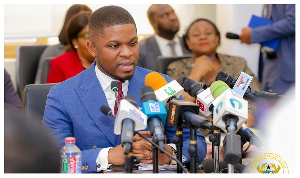Nigeria is investigating prominent participants in recent protests against police brutality for possible violations of a law against financing terrorism.
A filing by the Central Bank of Nigeria in a federal court in Abuja asking to freeze 20 bank accounts for 180 days was backed by allegations the account owners may have broken the counter-terrorism legislation, according to court documents obtained Wednesday. The court granted the regulator permission to block the accounts for three months on November 4.
The 19 individuals and one company affected by the measures “are alleged to be involved in suspected terrorism financing via their bank accounts,” the central bank said on October 20 in support of its motion.
The court order was necessary to “prevent further acts of economic and security sabotage” against the Nigerian state and to allow the regulator to continue its investigation, according to the filing.
While the filing didn’t mention the largely leaderless demonstrations that began last month and swept through Africa’s most populous nation, the accounts belong to people who were actively involved in them.
The only company targeted, Gatefield Nigeria Ltd., is a public affairs company that raised funds to support independent journalists to cover the protests.
The holders of six of the accounts told Bloomberg the freezes were implemented before the central bank submitted its application to the court.
The document cited a section of Nigerian law that states anyone involved in making funds available to terrorist groups can be imprisoned for life. A spokesman for the central bank didn’t respond to calls requesting comment.
“The extremely serious allegations against innocent citizens protesting against bad governance is really unfortunate,” Clement Nwankwo, director of the Abuja-based civil society organization Policy and Legal Advocacy Centre, said by phone on Thursday.
The document cited a section of Nigerian law that states anyone involved in making funds available to terrorist groups can be imprisoned for life. A spokesman for the central bank didn’t respond to calls requesting comment.
“The extremely serious allegations against innocent citizens protesting against bad governance is really unfortunate,” Clement Nwankwo, director of the Abuja-based civil society organization Policy and Legal Advocacy Centre, said by phone on Thursday. “It diminishes the very important independent role that the central bank should be playing on economic matters” he said.
Africa News of Thursday, 12 November 2020
Source: bloomberg.com













